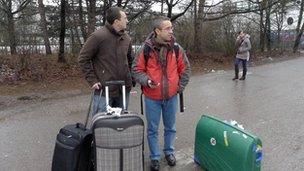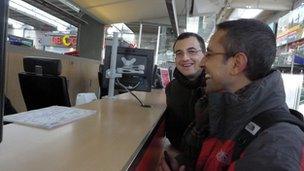Spanish job crisis: Go north, young workers
- Published

Spaniards Jose Sandino and Juan Alberto Fuente arriving in Munich
Spain's high unemployment rate of around 23% means many Spaniards, young people in particular, are leaving the country to find work elsewhere. One popular destination is Germany, where the jobless rate is under 7%. But starting afresh in a new country is challenging.
Munich's airport shuttle bus is dropping off newly arrived passengers in the city centre.
Among those getting off are Spaniards Jose Sandino and Juan Alberto Fuente.
Sandino and Fuente are thirty-something industrial engineers from Malaga, in southern Spain. Each has more than a decade of experience under his belt. But Spain's economic crisis has left them jobless. And now it's turned them into immigrants.
The two clean-cut, shivering men make their way to an information desk at Munich's main train station, and try out their beginner's German.
After a long ride on the underground, and getting lost a couple of times on the street, they find their new temporary home. It's a giant youth hostel, filled mostly with young backpackers.
Their room is small and bare, with two wooden beds, a desk and a wardrobe.
It's hard to believe now, says Sandino, but not long ago his consulting firm back in Spain was paying him a big salary. Then the Spanish housing sector collapsed and so did his business. Sitting on his bed, he says he can't believe that just this morning he was saying goodbye to his girlfriend and family.
"This move has been complicated," he says "because my girlfriend is pregnant and alone now. Our baby is due in July. They will come and join me here, where we don't know anything or anyone!"
He knows just one other person here - his travelling pal, Juan Alberto Fuente. They met during an intensive German language course in Malaga, and decided to take the plunge together.
Fuente says he could have gone on living indefinitely with his parents, knowing he'd be taken care of, but that was not his goal in life.
"If you send out tons of CVs and no-one even calls you for an interview, you have to go out and find work. You can't just sit on your hands," he says.
In their first couple of weeks in Germany, the two Spaniards say German companies are impressed with their CVs, but have told them to call back when they can speak German. So right now, they are learning the language as fast as they can.
'Distorted idea'
Spain's unemployment problem is driving highly educated people like Fuente and Sandino abroad by the tens of thousands. More people are now leaving Spain than moving there for the first time in more than a generation.
And Germany is a principal destination. But it's not an easy one.
"Coming north is hardly a waltz through the edelweiss," says Cristina Rico, a long-time Spanish resident of Munich. The unprepared, she says, usually fail. Having tea in a Munich café, she says a lot of Spaniards heard how German Chancellor Angela Merkel called last year for workers to come to Germany, without fully understanding the implications.

Waiting at the information desk at Munich station
"Spaniards have a distorted idea of finding work here in Germany," Rico says. "That it's easier than it is. I've seen people come here and turn around and go straight back home. They had diplomas but didn't speak English or German."
Cristina says that over the past year she has been bombarded with so many emails from unemployed Spaniards curious about Germany that she's started a Facebook page, called Spaniards in Munich. Every day people log on with questions about jobs, housing, healthcare, German language courses and diplomas.
In Germany, with its strong vocational schooling, even so-called unskilled jobs require a certificate of study. For example, Rico says, even to work in a pet shop you have to show you've been properly trained for that particular job.
Cultural differences
Patricia Cigala is a 22-year-old Spaniard from the south-eastern city of Murcia. She moved to Germany three months ago and found a job with a catering company.
She says one challenge has been adapting to how Germans interact with each other.

Spaniard Patricia Cigala says goodbye to her visiting mother at a bus stop in Munich
"Sometimes you find yourself in a German acquaintance's neighbourhood and you want to just pop by unannounced," she says shaking her head. "Don't do it!"
Cigala says in Spain friends and neighbours constantly drop by without warning. Not only are they welcome, but it's a given that they'll be served coffee, a beer, whatever's on hand. "Here, you have to have a date, an appointment," she says. "And you have to set it up days, sometimes weeks, in advance."
Ana Abad, a 20-year-old nanny from Madrid, has a head start on Cigala. She's been in Munich for a year and says she's made strong German friendships.
"Germans seem very closed off at first," she says. "But in the end you realise they're not cold at all. I've made true, good friends here."(More views of the cultural differences here), external.
Economics of migration
American economist Marten Olsen has studied the employment market across Europe.
He says the cost of hiring in Spain has risen 24% in recent years, because of wage and benefit increases. At the same time, he says, productivity has stayed nearly flat. In Germany, it's been the opposite.
"Spanish workers have only become a little more productive but wage compensation has gone up a lot. Germans are a lot more productive and wage compensation has only gone up a little."

Check-in at a hostel in Munich
The effect, he says, is that it has become relatively cheaper to hire people in Germany than in Spain.
In the old days, Olsen says, Spain could have devalued its currency, the peseta, to stay competitive. That would help stem the exodus of workers now. But as part of the euro, that option is not on the table.
Additional reporting by Rob Hugh-Jones
Listen to more on this story atPRI's The World, external, a co-production of the BBC World Service, Public Radio International, and WGBH in Boston.